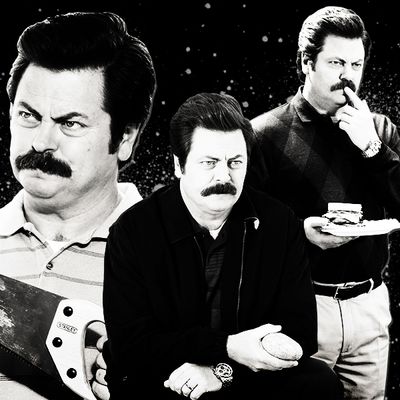
America cemented its idea of modern-day masculinity in a short window of time, somewhere between Grandpa’s return from World War II and the end of the 1960s. He was a precise kind of “real man,” with square shoulders and an unwavering love of country; he could throw a football, kill his dinner, and make love to a woman. There were different models for the new manhood: Some would point to Clint Eastwood in any of his spaghetti Westerns, while for others it was Jim Brown plowing down the football field. There’s even an entire political party that’s pretty sure Ronald Reagan was the last great American man. It is, of course, a silly notion, and one that was thankfully dying until Parks and Recreation — now in its final season — made its debut a few months after President Obama was sworn in. America was introduced to a character who both lampooned the idea of the macho maverick and gave viewers a new, masculine hero in Ron Swanson (Nick Offerman).
In a time when we casually use terms like lumbersexual and posh New York gyms embrace “the sexiness of the rural,” it’s no surprise that Swanson swiftly occupied a corner of the Zeitgeist. Men in Pendleton flannels may fantasize about roughing it for a little while; Ron Swanson can and does. He builds things, shoots things, and can’t stand bullshit. He marries the woman who once played Xena: Warrior Princess. And he prefers to keep to himself in an era where everybody wants to tweet their feelings and Instagram their dinner.
While Swanson shunned technology on Parks and Recreation, in the real world, he became an internet sensation. His quotes were turned into motivational posters at BuzzFeed, and a “Cats That Look Like Ron Swanson” Tumblr was born. Even Offerman himself, a professional craftsman, created a set of wooden emoji that sold out almost immediately.
Personally, I’ve never been able to pinpoint why I like Swanson so much. In real life, I’d do everything I could to avoid a debate with him on why it’s your God-given right as an American citizen to eat all the garbage you want and die of a heart attack. I try to block out the Rush Limbaugh and Sean Hannity types yelling about the same freedoms; it took me a long time to figure out why Ron Swanson doing it was fine.
The crucial difference between Swanson and previous emblems of manhood is that he’s there to make you laugh, not provide a template for your life. No matter how great it would be to send back a steak you’re unsatisfied with at a restaurant and say, “Give me all the bacon and eggs you have,” nobody really does that. Yet there’s something equal parts hilarious, badass, and life-affirming when the waiter walks away and Swanson pumps his fist like he’s just won a battle.
Ultimately, though, Swanson is more of a relic than a role model. Masculinity as we once knew it is on its way out, and there’s something comical about the last man standing. The dude, the one who thinks it’s totally acceptable to sit on the subway with his legs spread wide apart, is now rightfully ridiculed. A rich presidential candidate who fancies himself the next Reagan misguidedly thinks it’s acceptable to say he has “binders full of women” — his words spark a women’s movement. Masculinity in the age of Ron Swanson feels like watching its last gasps. The outdated idea that men are in any way better than women no longer holds water, and, frankly, it’s got a lot of men scared. Many don’t want to admit that there aren’t any John Waynes or Ernest Hemingways coming along anytime soon, and that those guys weren’t all that great in their own time, anyway.
Ron Swanson, on the other hand, won’t endure as a symbol of anything once Parks and Recreation ends later this month. He may not be understood by future viewers of the show when it inevitably plays in syndication. In many ways, he’s a modern-day Archie Bunker: thickheaded, unable or unwilling to accept change, and oftentimes ignorant. He’s a caricature of a certain breed of man that is becoming more obsolete with each passing day; some are like him, others think they are. For his part, Swanson has characterized masculinity in the best way possible: by making us laugh.




